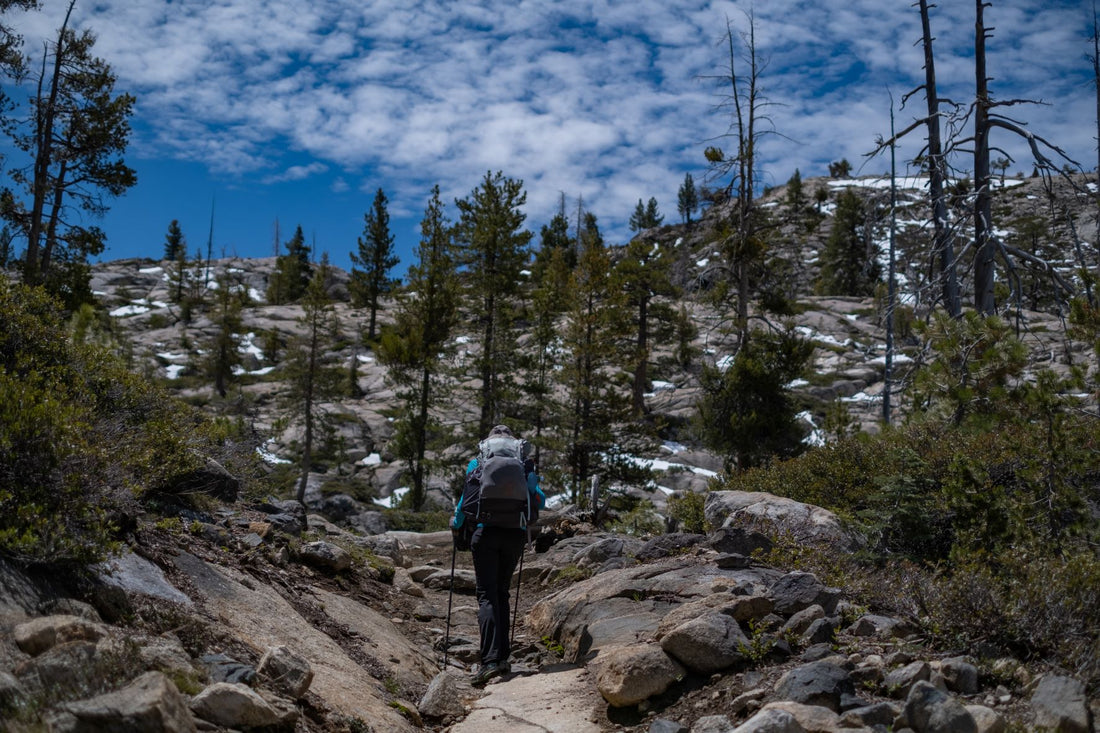
Determine How Long to Hike a Mile: Tips and Tricks
How long does it take to hike a mile? While there are many variables involved, it takes the average person about 30 minutes to hike a mile on gentle terrain.
However, that's not the end of the story! Below, we highlight:
- How to determine your own personal pace for how long it takes to hike a mile
- 5 variables to take into consideration that can impact how long it takes to hike a mile
- Tips for how to guesstimate your average hiking time on different terrains and in different conditions
- Additional resources to help with your next hike
Let's get started!

How do I determine my pace compared to an average hiker for how long it takes to hike a mile?
As we mentioned above, the story doesn't end with a simple: It takes 30 minutes to hike a mile. That's just an average, and it is important to know your own pace compared to an average hiker when you're planning a hike. This way, you know approximately how long it will take you to complete your trip.
Knowing how long it takes you to hike a mile is a great skill for ensuring a successful day hike or overnight backpacking trip. To gauge this, you can use a timer on your watch or phone to see how long it takes you to walk a mile at your normal, comfortable pace.
Use a map to locate where the mile begins and ends. Ideally, you should find a trail with a trail junction or sign, cabin, water crossing, or other landmark a mile away from the trailhead or your starting landmark.
Make sure you take natural steps to find out how long it will take you to hike a mile. Overstriding or hiking quicker than you typically do will not give you an accurate time. You can complete this exercise over time to see how your pace may change over time.
What variables will affect how long it takes me to hike a mile?
Not all trails are a "walk in the park," as they say—even those that are literally a walk in an actual park! Below are five different factors that can impact the pace of how long it takes to hike a mile.
1. Your Fitness Level
Whether you are in optimal shape or haven't worked out in a while, the amount of time it will take you to hike a mile will differ. Looking for a new fitness goal? Try working to decrease the amount of time it takes you to hike a mile over the course of a year.
2. Obstacles on the Trail
If you are hiking over slippery roots, crossing streams, or navigating rocks and boulders, the time it will take you to hike a mile will increase. When planning a hike, research the trail to see if these obstacles are likely to be present.
3. Weather
It can be rather difficult hiking a mile in poor conditions, such as heavy rain, snow, sleet, hail, or immense humidity. Try to time your adventures for better weather windows. Going out anyways? Learn how to prepare for the rain!
4. Weight on Your Back
The heavier your backpack is, the more effort it will take to hike a mile. By transitioning to a lightweight backpack and carrying lighter gear, you will make hiking easier, especially on difficult trails. Just beginning? Learn how to start going lightweight today!
5. Elevation Changes
Needing to make big climbs can noticeably slow you down. Meanwhile, you may notice that you can hike a mile faster going downhill. Additionally, if you're hiking at a high elevation and your body hasn't fully adjusted to that yet, you may find that you're a little more tired and may move more slowly.

Now, how do I use this information for hiking on a trail?
When researching a trail, either online or in guidebooks, you may read about book time. Book time is a formula used to estimate the time a given hike will take. For flat or very gradual terrain, the calculation of 30 minutes for every mile is used.
For every 1,000 feet of elevation gain (uphill), you'll add an extra 30 minutes. Descent (downhill) is assumed to take as long as walking on a flat trail, though some hikers may find that they're faster or slower in one direction. Remember to find what's true for you.
There are many factors that may make your pace differ from book time. Your fitness level, the terrain, and weather will be factors in the amount of time it will take you to hike a mile. You may also simply find yourself hiking faster or slower than book time. However, knowing this calculation is a great jumping off point to start planning your hike!
Knowing that it takes an average person about 30 minutes to hike a mile is a great start for planning your next hike. Make sure to take into consideration the many variables that may cause you to slow down, as well as how you could potentially improve your time.
Resources to Help Plan Your Next Hike
Knowing how long it takes to hike a mile is only the start to great adventures ahead! Make sure to check out some of our other resources on the Light Feet blog to help plan your next trip to the wilderness:
- Pack Liners vs. Pack Covers: Which to Use for Backpacking
- 8 Tips & Tricks for Solo Hiking Trips
- Hydration 101: Your Guide to Water While Hiking
- How to Take Care of Your Gear Post-Hike (And Get Motivated to Do It)
- Peeing in the Woods With Help From Your Pelvic Floor
And, remember, lightweight gear can really make a difference if you're trying to quicken your pace and cover more daily mileage. Gossamer Gear's packs, trekking poles, and shelters can help you fly along the trail!
